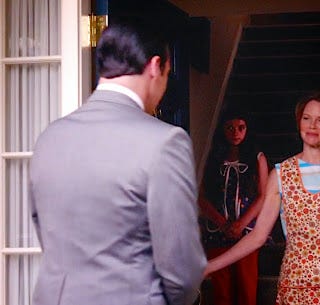SEASON 7, EPISODE 12.

The very best thing in the entire episode, and maybe in the series, was the scene at the Wisconsin house, and the dark daughter lurking in the shadows of the home of Di the Death Waitress' ex-husband: blandly resentful, shaggy, never giving a sign of being part of these waxy, pale Christians (and vice versa), she gave me real chills.
The ex-husband was pretty good too, not ostentatiously crazy, merely vicious -- a man with a good enough explanation for his ugliness that you might not at first consider how horrible a husband he must have been, and must still be (did he really say in front of his wife that she didn't know any better?). I begin to see not only why Diana left, but also why Don is so obsessed with her -- her horrible pre-life replicates his own, except she had no magic to escape it with. Don is retracing his own steps through her.
In the home stretch Mad Men is getting stranger, and it’s easier to see why it has to in Don’s scenes than in anyone else’s because he’s the haunted one — everyone else is trying to figure out the life they’re in, and Don is trying to figure out the life he never had. Several people have speculated that Don is already dead (“and he’s finally realizing it”), and that’s getting to be a good bet, but for the moment I’m looking at it as a simpler proposition: Don knows that the life he took up is not his, that it’s unsustainable, and he’s leaving it behind.
His departure from the Miller meeting signals this by being super-weird; no one makes anything of the newly-imported hotshot leaving in the middle of a presentation except Ted, and his reaction is absurdly inappropriate — it looks like, “Oh, that son of a gun.” (I thought people would beginning clearing their throats when Don spent all that time staring out the window at the crucifix in the sky.) And Don is super-weird through most of the episode; tightly-wound in his meeting with Boss Hobart, hallucinating Bert, unconvincingly lying and apologizing at the Wisconsin house, there’s nothing comfortable about him until he decides to make that detour.
Maybe after a while the heightened scenes with Peggy and Roger will seem as necessary, but like I said, Peggy has a more real-life problem to figure out, so the roller-skating and badass slo-mo strut are jarring. Peggy’s become such a knotted-up, suffering careerist that she’s earned a more genuine nervous breakdown. Joan’s fight with the arrayed forces of sexism is more realistic, and it’s interesting in a trad TV social-commentary way. But we came here, or at least stayed here, not to see the Sixties spin out, but to see what happens to Don. It won’t be long now.


